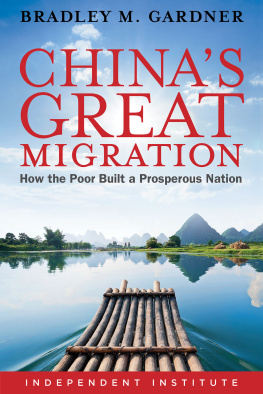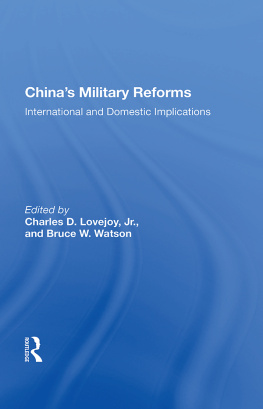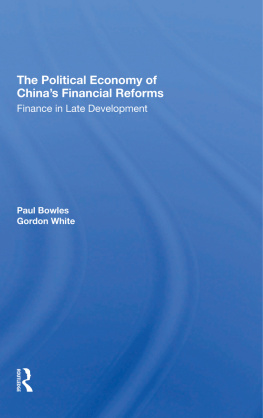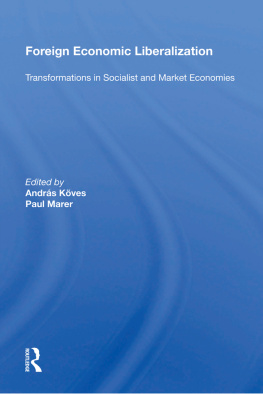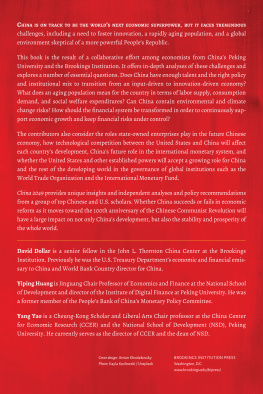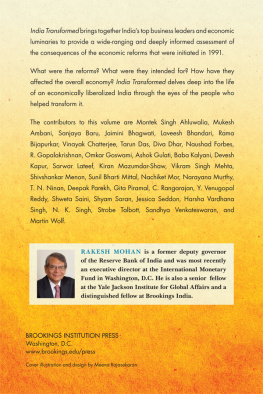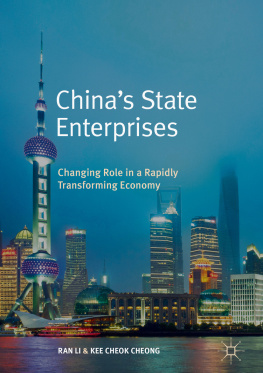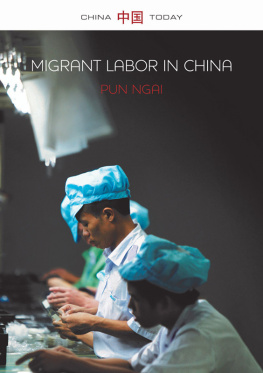Contagious Capitalism
Contagious Capitalism
GLOBALIZATION AND THE POLITICS
OF LABOR IN CHINA
Mary Elizabeth Gallagher
PRINCETON UNIVERSITY PRESS
PRINCETON AND OXFORD
Copyright 2005 by Princeton University Press
Published by Princeton University Press, 41 William Street, Princeton, New Jersey 08540
In the United Kingdom: Princeton University Press, 3 Market Place, Woodstock,
Oxfordshire OX20 1SY
All Rights Reserved
Third printing, and first paperback printing, 2007
Paperback ISBN-13: 978-0-691-13036-1
Paperback ISBN-10: 0-691-13036-1
The Library of Congress has cataloged the cloth edition of this book as follows
Gallagher, Mary Elizabeth, 1969
Contagious capitalism : globalization and the politics of labor in China / Mary Elizabeth Gallagher.
p. cm.
Revision of the authors thesis (Ph.D.)Princeton University, 2001.
Includes bibliographical references and index.
ISBN 0-691-11761-6 (cloth : alk. paper)
1. Investments, ForeignGovernment policyChina. 2. Investments, ForeignPolitical aspectsChina. 3. ChinaCommercial policy. 4. LaborChina. 5. CapitalismChina. 6. GlobalizationEconomic aspectsChina. 7. ChinaPolitics and government1976 I. Title.
HG5782 .G35
330.951dc22 2004054930
British Library Cataloging-in-Publication Data is available
This book has been composed in Sabon
Printed on acid-free paper.
press.princeton.edu
Printed in the United States of America
10 9 8 7 6 5 4 3
To Magda and Elinor
Contents
CHAPTER ONE
Introduction
CHAPTER TWO
Contagious Capitalism
CHAPTER THREE
Blurring Boundaries
CHAPTER FOUR
The Unmitigated Market
CHAPTER FIVE
Use the Law as Your Weapon!
CHAPTER SIX
From State-owned to National Industry
CONCLUSION
The Contradiction of Reform and Openness
APPENDIX
Firms and Interviews
List of Illustrations
FIGURES
TABLES
Acknowledgments
THIS BOOK WOULD NOT have been possible without institutional and financial support from the following institutions: At Princeton University, the Department of Politics, the Center of International Studies at the Woodrow Wilson School of Public and International Affairs, and the Department of East Asian Studies all generously funded parts of the research. At the University of Michigan, the Department of Political Science, the Center for International Business Education, the Center for Chinese Studies, and the Institute for Industrial and Labor Relations all helped in one way or another to improve the research and the writing of this project. I also thank the Foreign Affairs College in Beijing and East China University of Politics and Law in Shanghai for hosting me at different times and supporting my research endeavors.
My undergraduate adviser at Smith College, Steve Goldstein, deserves thanks for first sparking my interest in Chinese politics. His enthusiasm for excellent teaching and scholarship encouraged me to pursue an academic career. My dissertation committee at Princeton, which included Lynn White, Atul Kohli, and Anna Seleny, all deserve much thanks and gratitude for encouraging me, for reading many drafts, and for generally being nice people and exemplary scholars. Lynn White deserves special thanks for his gentle impatience, which helped me to finish both the dissertation and the book. In addition to my committee at Princeton, I also thank the many other scholars and teachers who gave generously of their time and their ideas. They include Nancy Bermeo, Kathryn Stoner-Weiss, Sheri Berman, Michael Doyle, Gil Rozman, Jeff Kopstein, Gary Bass, and Kate McNamara. Monica Selinger and Edna Lloyd provided excellent administrative support and help for every conceivable problem. My fellow graduate students at Princeton were indispensable as colleagues and friends. We were all lucky to have each other. I would especially like to thank Michele Penner Angrist, Dietlind Stolle, Shinju Fujihira, Kimberly Morgan, Mark Stephan, Sharon Barrios, Vanya Krieckhaus, Susan Kannel, Marc Berenson, Xiaonong Cheng, Bell Kwok, Xu Wang, Phil Saunders, Jeannie Sowers, and Michael Ross.
As the project grew from a dissertation into a book many others helped by listening to my ideas or reading various chapters. They include especially the community studying China at the University of Michigan, especially Brad Farnesworth, Al Feuerwerker, Whit Gray, Ching Kwan Lee, Ken Lieberthal, Linda Lim, Jinyun Liu, Albert Park, Marty Powers, and Wang Zheng. Many others commented on parts of the project and gave generously of their time and ideas. They include Eric Thun, Anita Chan, Marc Blecher, Elizabeth Perry, Iain Johnston, Merle Goldman, Mark Selden, Ruth Collier, Elizabeth Remick, Dorothy Solinger, Dali Yang, Yasheng Huang, Don Herzog, Meredith Woo-Cumings, Mark Frazier, Bill Hurst, Jaeyoun Won, Kevin OBrien, Neil Diamant, Stanley Lubman, Scot Tanner, Isabelle Thireau, Ruth Rogaski, Andy Mertha, Jerry Cohen, Noga Morag-Levine, Rob Franzese, Zheng Yongnian, Edward Gu, John Campbell, Young Jin-choi, Jacob Eyferth, Larry Root, Ian Robinson, Ken Kollman, Ashutosh Varshney, and Jennifer Widner. While at the University of Michigan, I have had the help and assistance of very able research assistants. I thank Peng Du, Min-hua Huang, Juan Chen, and Lyric Chen. At Princeton University Press, I thank Chuck Myers for taking an early interest in this project and helping it through the publication process. I also thank the anonymous reviewers for suggesting additions and changes that improved the final product. Jennifer Nippins and Cindy Crumrine supplied critical help with editing and copyediting.
In China, the most grateful thanks and appreciation go to the managers and employees of the firms that allowed me to visit more than once, always made time for me, and treated me and my numerous requests graciously. Many other people also helped this project along. In particular I would like to thank Du Jinhong, Zhang Cuiying, Zhang Jun, Pang Qiong Zhen, Tu Hua, Wang Shuxin, Hu Wenbiao, Zeng Jia, Dai Jianzhong, Feng Tongqing, Ko Matsui, Murao Tatsuo, Gao Huaxin, Jiang Junlu, Wang Jianping, Tang Jianyu, Chu Hsi-Cheng, Takeo Nishishiba, Lin Yizong, Jia Zengjun, Steve Mufson, Lei Peng, Chen Weiguo, Lu Dongxia, Liu Yingqiu, Chen Weiguo, Shi Meixia, Jin Canrong, Phil Pan, Dong Baohua, Li Lingyun, Song Jing, Erika Helm, and many others. I also thank the other foreign teachers at Foreign Affairs College for their support and friendship, especially Grace Fan. In Hong Kong, Jean Hung and the Universities Service Centre, Robin Munro, Tim Pringle, and Joyce Wan all offered their help with the research. While I am very grateful for all the helpful advice and constructive criticism received over the years, the errors and omissions that remain are entirely my own.
Some of the analysis presented here draws from previously published work. Parts of originally appeared as Time Is Money, Efficiency Is Life: The Transformation of Labor Relations in China, Studies in Comparative International Development 39:2 (Summer 2004): 1142. I am grateful for the publishers permission to quote from these works.
As always the deepest thanks and gratitude go to ones own family, who have had to bear many sacrifices and boring conversations. My parents, Munsey Alston and Steve Gallagher, are heartily thanked for letting me go to China in 1989 when everyone else was canceling. I thank my brothers and sister, Tim, Mike, Joe, and Kate Gallagher, for listening to me and asking the obvious questions. (What is FDI?) To my daughters, Magda and Elinor, who think that all I do is sit in front of a computer, I thank them for being patient most of the time. Finally, I thank my husband, Ken, for all his help and support. He used to help me proofread and edit but now his time is better spent on trips to the playground and the museum. This is of course just as it should be.
Next page

